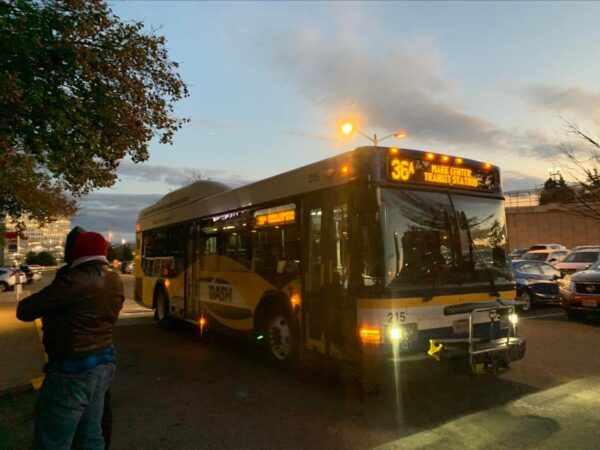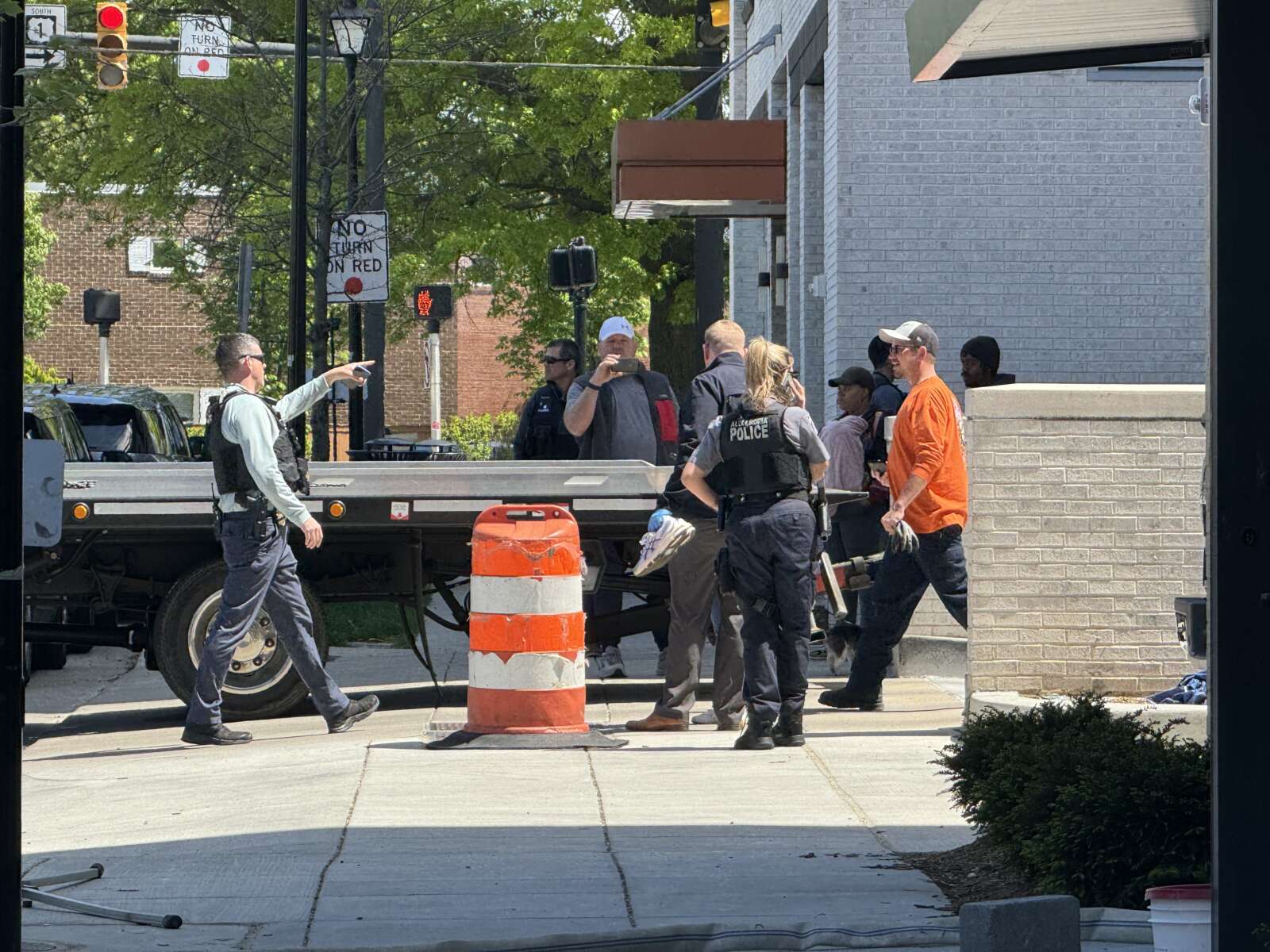
City Council says developers should be financially on the hook for the traffic impacts of their projects — but they disagree over how long payments should last.
Alexandria currently relies on developers to pay for the impact their projects have on local roads and transportation networks. When it comes to follow-through, however, the city has no meaningful mechanisms to hold accountable developers who don’t make good on the promises they made during the application process.
Faced with this problem, the city has drafted new zoning ordinances that would overhaul how developers offset these impacts. Like the Planning Commission before it, City Council welcomed the changes in principal but said not enough details have been sorted through.
The new policy would take the disparate Transportation Management Plans (TMP) around the city — transit-supporting programs that go along with new developments to offset their transportation impact — and bring them all under one umbrella.
The core issue is that the city says TMPs have been too easy for developers to ignore. Staff said at the City Council meeting last weekend that the fines for not following through on a TMP are fairly inconsequential. Developments from before 2014 — which account for 63 of the 106 total TMPs in Alexandria — only receive a $50 fine for not following their TMP.
Instead, the new zoning would change the system so funding supposed to go to TMPs instead goes directly to the City of Alexandria. That funding is then redistributed by the city to projects across the city.
The balance of city-wide transportation projects vs local projects around where the new development occurs had been 70/30, but at the City Council meeting, staff said that had been adjusted to a 50/50 split.
While the City Council was unanimous in agreeing that the change was better overall than the current system, there were some divisions over whether the TMP funding from developers should end after 30 years, taper off over time, or continue in perpetuity.
For City Council member John Chapman, the concern was that TMP funding could become a core part of funding for transit improvements that would be left high and dry.
“I don’t want to close the door on resources after three decades,” Chapman said. “I’m very nervous about that. If we have a stream of resources that have been paid into and are continuing to be paid, I’d support that.”
Chapman said a scenario where development slows down could have an impact on some of the city’s more ambitious transit projects — some of which are already struggling to find funding.
“We’re getting more creative about transportation projects we do and we’re seeing costs go up,” Chapman said. “We can’t figure out what development is going to look like… so closing the door on those resources is not necessarily what we should do.”
But Mayor Justin Wilson said it would be continue charging developments for transportation funding after they’ve been around for decades while other developments that predate them, and might have a larger impact on local roads, pay nothing.
“In the past, we’ve wanted those to go forever because we assumed the impact would go forever,” Wilson said. “I think there’s a point where we can say ‘this development has been established for three or four decades, it’s part of the community, the impacts are not unlike anyone else.”
Cameron Station became a hypothetical flashpoint on the council for the zoning change. While Wilson cited it as an example of a development that maybe should not be required to continue paying into the TMP forever, Chapman noted that the city has expressed interest in a new bridge over nearby rail lines that the TMP funding could be a useful tool in funding.
“I don’t know if a cut off is right, or a stair step down, but I do recognize that at some point… [Cameron Station] becomes so integrated in the fabric of our community that, should they be paying a seperate fee on top of what you pay or I pay because their development happened in the last 40 years?” Wilson said.
“One day, CSX and the railroads will allow us to do a multimodal bridge there,” Chapman said. “It will have a huge cost. If we’re looking at that project, I believe with this policy we are now starting to cut off resources that could go to that project that would help the residents in that section a lot more than it would help me or you.”
City Council member Alyia Gaskins also noted that there are still concerns that, even with the split between citywide and local funding being split 50/50, communities closest to developments lose out in the new system.
“In the old model, the projects were more localized,” Gaskins said. “There is some fear about: even if it’s a 50/50 split, is that really the balance that is needed? And how does that play out with making sure some of the neighborhoods in the closest proximity to some of these developments are really getting the benefit.”
For some on the City Council, there were opportunities for a middle ground.
“Did we evaluate in a 30 year period something like a phase out or a step down?” City Council member Sarah Bagley said. “I’m in the middle of our colleagues here. I understand the need at some point to phase these things out, but maybe not have it be cut and dry.”
The City Council voted to defer the zoning change to allow for further review and discussion.
Recent Stories

For many remote workers, a messy home is distracting.
You’re getting pulled into meetings, and your unread emails keep ticking up. But you can’t focus because pet hair tumbleweeds keep floating across the floor, your desk has a fine layer of dust and you keep your video off in meetings so no one sees the chaos behind you.
It’s no secret a dirty home is distracting and even adds stress to your life. And who has the energy to clean after work? That’s why it’s smart to enlist the help of professionals, like Well-Paid Maids.

Monarch Montessori School is now enrolling infants, toddlers and three year-olds for its full-time Montessori program. We offer a seamless enrollment process which involves submitting an application for review, paying the enrollment fee and submitting the remaining enrollment materials before your proposed start date.
At Monarch Montessori School, we aim to provide an authentic Montessori learning experience. At our Alexandria location, we currently have 8 openings in our Primary classroom (ages 3-6), and 6 openings in our Toddler classroom. Additionally, there are 3 infant openings at this time.
Our first floor space is an open concept. Infants and toddlers share the same large classroom. Children ages 3-6 are in two classrooms on our second floor. Each classroom has one lead and assistant guide. We offer a year-round program, with intermittent breaks for Spring Break and Winter Break.
Scholarship Fund of Alexandria Annual Gala & Auction
Do good while having a good time at the Scholarship Fund of Alexandria’s 38th Annual Gala and Auction at the Hilton Alexandria Mark Center. The fun begins with a 2-hour open bar reception while mingling with 499 other Alexandrians who






